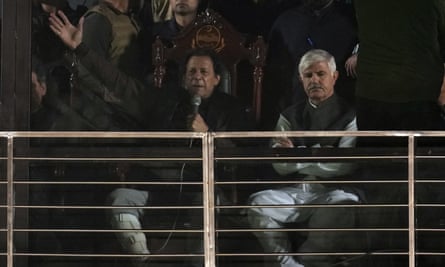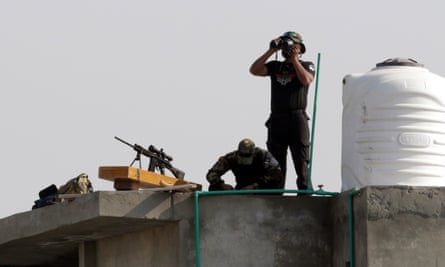Pakistan’s former prime minister Imran Khan told tens of thousands of supporters on Saturday that he would fight until his “last drop of blood” in his first public address since being shot in an assassination attempt this month.
The shooting was the latest twist in months of political turmoil that began in April when Khan was ousted by a vote of no confidence in parliament.
Saturday’s rally was the climax of a so-called “long march” by Khan’s Pakistan Tehreek-e-Insaf (PTI) party to press the government to call a snap election before parliament’s term expires in October next year.
“I have seen death from up close,” said Khan, who hobbled to the stage with a walking frame to speak to supporters from a plush seat behind a panel of bulletproof glass.

Photograph: Anjum Naveed/AP
“I’m more worried about the freedom of Pakistan than my life,” he told the crowd. “I will fight for this country until my last drop of blood.”
Khan said on Saturday he was calling off his protest march to Islamabad because he feared it would cause havoc in the country. The protests were to culminate in a march to Islamabad which threatened to worsen political turmoil in the nuclear-armed country, which is also battling an economic crisis.
“I have decided not to go to Islamabad because I know there will be havoc and the loss will be to the country,” Khan told a gathering of thousands of supporters in the garrison city of Rawalpindi, near the capital, Islamabad.
Khan attracts cultish devotion from supporters but on Saturday made his speech hundreds of metres from the bulk of the crowd of around 25,000 to 30,000, separated by coils of barbed wire and a buffer of police officers. Mobile phone signals were jammed in the vicinity.

A police official told local television channel Geo TV that a total of 10,000 personnel had been deployed for the event, with snipers positioned at various points for his security. Khan said on Saturday he had been told by various security sources there was still a threat to his life.
The interior minister, Rana Sanaullah – who Khan accuses of being involved in the assassination plot – issued a “red alert” on Friday, warning of security threats to the rally. He listed Pakistan’s Taliban and al-Qaida among the extremist groups that could harm Khan.
Authorities threw a ring of steel around nearby Islamabad to prevent his supporters from marching on government buildings, with thousands of security personnel deployed and roads blocked by shipping containers.
Khan also said he was consulting his party, the PTI, on the possibility of resigning from all provincial assemblies in a fresh bid to push for early elections. PTI has already resigned from the federal parliament, but remains in power in two provinces and two administrative units.
The ousted leader was shot in the shin on 3 November when his anti-government protest convoy came under attack in the east of the country, in what his aides said was a clear assassination attempt by his rivals.
He named the prime minister, Shehbaz Sharif, and a senior military official of plotting his assassination, but both the government and military have denied involvement. Sharif has called for a transparent inquiry. One person has been arrested over the incident and said he acted alone.

Saturday’s rally took place two days after the government named a former spymaster under Khan as the next military chief. General Syed Asim Munir’s appointment ended months of speculation over a position long considered the real power in the nuclear-armed Islamic nation of 220 million people.
Munir served as chief of the Inter-Services Intelligence agency under Khan, but his stint ended after just eight months after the pair reportedly fell out.
Pakistan’s military, the world’s sixth-largest, is hugely influential in the country and has staged at least three coups since independence in 1947, ruling for more than three decades.
With Agence France-Presse, Reuters and Associated Press
